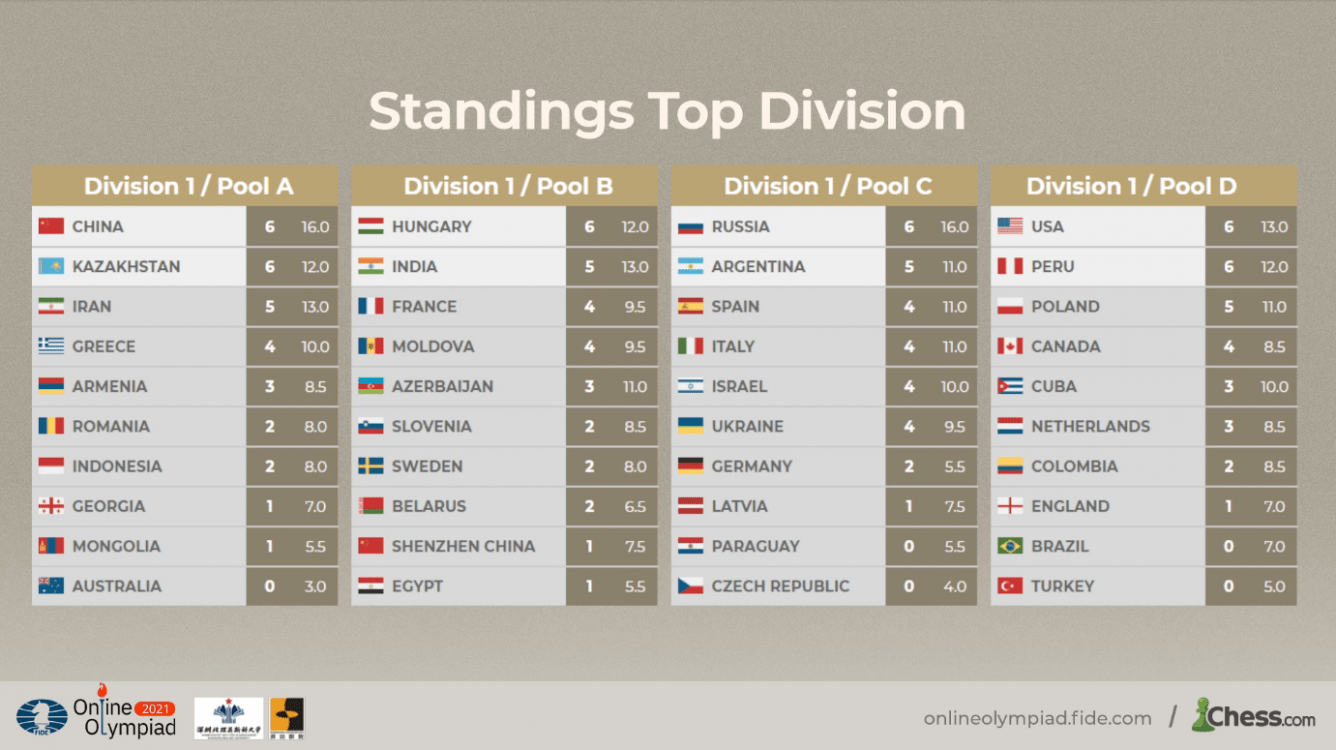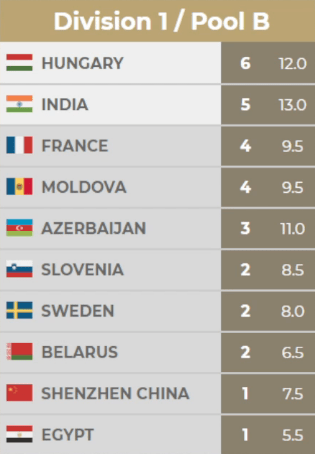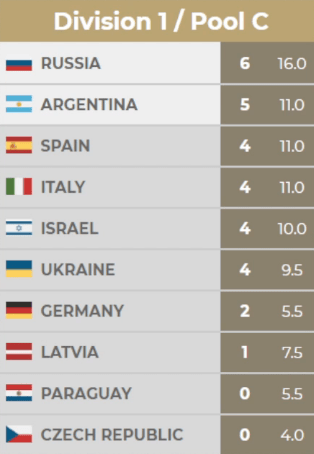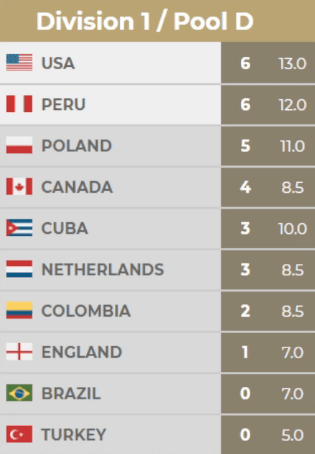
FIDE Online Olympiad Division 1, Day 1: Elite Teams Shine
We all love olympiads. There's the Olympics, and, of course, the Chess Olympiad. In this one, the time has come for competition between the strongest teams out there, as the top division started playing today.
The format of the tournament is three rounds per day for a total of nine rounds. Today the teams played the three first rounds. There are, without a doubt, plenty of fight and decisive matches ahead of us, but some of today's games will surely define the outcome of the final standings.
The matches were tremendously interesting to watch, both for spectators and for coaches, who are always seeing instructive material.
The Division 1 games of the FIDE Online Olympiad can be found on our live events platform: Pool A | Pool B | Pool C | Pool D. On playing days, expert commentary is provided on Chess.com/TV starting at midnight Pacific / 9:00 a.m. Central Europe.
Live coverage of day one. Watch all of the live coverage at youtube.com/chess.
Pool A
Pool A features a number of super-grandmasters as well as young players who are considered very likely candidates to climb their way up to the very pinnacle of the chess world. Fully established top players such as GM Ding Liren and GM Wei Yi are defending the honor of their country of China, while young and tremendously gifted grandmasters, like Iran's former U-20 World Champion GM Parham Maghsoodloo, U-20 World Championship medal winners GMs Aram Hakobyan and Haik Martirosyan of Armenia, and other prodigies, such as GM Amin Tabatabaei of Iran and GM Bogdan-Daniel Deac of Romania are pleasing us with their creative play.
The first round saw what to my mind is a rather unexpected outcome: Romania beat Iran! Of course, Romania is a very strong team, but Iran's team is filled with world's best young talent, such as Maghsoodloo, Tabatabaei and IM Khademalsharieh Sarasadat. Several games ended in a draw, but Maghsoodloo lost to Deac, who played an absolutely brilliant positional game, having squeezed his opponent in the Catalan:
In round two, there were a number of interesting games. I would recommend you take a look at the match between Iran and Armenia, as all the young prodigies clinched in a battle right there. A 4-2 win for Iran!
Round three also saw quite a few upsets: for example, while China beat the underdog Indonesia 5-1, the 2500-rated GM Priasmoro Novendra beat Wei Yi in a fascinating game, that saw Wei get an advantage, give it up, and then... flag in this position.
Had White played some normal-looking move, such as Rh6 or a4, he would have been doing just fine, but the Chinese super-grandmaster didn't quite manage his time, and Indonesia scored a point versus the strongest team of the pool.
China won all three matches and is sharing first in the group after today's games. However, if anyone is a hero of the group, it's definitely Kazakhstan, which also won all three matches and is sharing first with China, despite not having any super-grandmasters on their team. Instead, most players, such as IM Zhansaya Abdumalik, IM Denis Makhnev, and IM Bibisara Assaubayeva, are young prodigies. It's always inspiring and refreshing to see the country give their young talents a shot at an event of this importance. Off course, this one does require a young player and a female player on the team, but most of their team is young and could play on any board!
It will be interesting to watch the coming match of the two leaders, as well as to see how the young talented players from Iran and Armenia would do over the course of the next few days. Stay tuned!

Pool B
The B-pool has a number of participant teams that have traditionally been leaders of the chess world, including India, Azerbaijan, France, and Hungary.
However, many of these teams don't have their strongest fields present. For example, GM Maxime Vachier-Lagrave, who just won Sinquefield Cup, isn't representing France, and neither is GM Alireza Firouzja, who is now competing in Norway. But, nevertheless, there is a ton of fascinating action to follow!
In the first round, favorites took what was supposed to be theirs, even though some results were a bit unexpected: India crushed Egypt 6-0, while Azerbaijan destroyed Sweden 5.5-0.5, despite the fact such experienced players as GMs Nils Grandelius and Pia Cramling are defending the colors of the Swedish flag.
Next round, France tied India 3-3, with most games ending in a draw, and the two last boards exchanged a series of shots: GM Praggnanandhaa Rameshbubu lost to the youngest French GM at the moment, Marc Andria Maurizzi, while Vaishali, Pragg's sister, beat Florence Rollot.
The Azerbaijani team drew China's B team, while Sweden demolished the very solid team of Belarus 5.5-0.5, a great comeback after the last difficult match.
Meanwhile, Hungary just kept on winning. We'll see more about their team in a second.
In round three, India beat Sweden 4-2, as GM Viswanathan Anand outplayed Grandelius and GM Baskaran Adhiban beat GM Erik Blomqvist. Hungary, at the same time, kept up its strong run to win their third match in a row (4-2 versus Azerbaijan) and ended up in clear first place after the first day. Here's the game my friend and teammate at Webster University (I still say teammate even though I just graduated last May) GM Benjamin Gledura won against GM Rauf Mamedov.
All in all, Hungary is leading with six points, but they haven't played India and France yet, so nothing is decided.

Pool C
This is a tremendously strong pool, perhaps the strongest one of all four, as here we see the very top teams of Russia and Ukraine, as well as almost-top teams like Germany, Israel, and Czech Republic with their amazingly sharp and vivid GM David Navara on board one.
The very first round in this pool might end up defining the future winner, as the two top seeds Russia and Ukraine faced each other. The former won 4.5-1.5, but GM Vassily Ivanchuk beat GM Daniil Dubov in an excellent game, which featured a highly instructive exchange sacrifice.
Meanwhile, Italy beat the Czech Republic 3.5-2.5, even though Navara won a very classy positional game on board one, which will give you a better understanding of a strength of the bishop versus a knight in open positions.
Latvia doesn't have the strongest team at the moment, as their leaders GMs Igor Kovalenko, Arturs Neiksans and Nikita Meskovs aren't playing, but they have been fighting very decently versus top seeds. This round, they lost to Israel with a decent score.
In round two, Russia kept up its strong run, beating Germany 6-0. The following gorgeous positional game does a great job of showcasing the value of space:
Meanwhile, Argentina beat Israel 3.5-2.5 in a very tense match, Ukraine barely beat Latvia (where a big sensation happened, as FM Egors Lavendelis beat GM Anton Korobov with black without any huge clear blunders committed), and Spain crushed Czech Republic 5.5-0.5, as Navara skipped the round. Italy beat Paraguay 4.5-1.5, which was also a rather convincing match.
In round three, Russia kept crushing everyone, having beaten the Czech Republic 5-1 (but Navara shined, beating GM Alexander Grischuk, who handled the Najdorf a bit too aggressively and over-pushed). Ukraine beat Germany 4.5-1.5 (which should have been 5.5-0.5, had GM Kirill Shevchenko not lost an overwhelming position to GM Alexander Donchenko). The matches between Israel and Italy, as well as Spain and Paraguay were stubborn, with Israel and Spain each winning 3.5-2.5.
Latvia again did a terrific job as an underdog, holding the much higher-rated team of Argentina 3-3.
So far, it looks like in this pool the leader has the best chances, compared to the other pools, as Russia has already beaten its most dangerous rival Ukraine, as well as another top-tier team Germany. However, there are still many more rounds to go. Argentina is doing a phenomenal job, solely occupying the second place with two wins and one draw. They have yet to face Ukraine and Russia, so we'll see how it goes for them. Four (!) teams are sharing 3rd-6th with four points, namely Israel, Ukraine, Italy and Spain.

Pool D
The D-pool is another very exciting field to follow. The highest-ranked and most dangerous teams are the United States, Poland and England. However, Peru, Brazil and others also have a number of strong players, so the event promises some very interesting chess. There was some surprise in the standings after day one.
Round one already proved rather tough for the favorites. The U.S. beat Canada 4.5-1.5. England, however, lost to Peru 2.5-3.5. In that regard, I'd like to congratulate my teammate GM Emilio Cordova, who won a very nice attacking game against the legend of British chess GM Michael Adams. Take a good look at that f2-f4, Rf1-f3-g3 maneuver.
Finally, among the top teams' matches, Poland beat Brazil 3.5-2.5, but that could have definitely gone the opposite way. Let's see how:
In round two, the US beat Brazil 4-2. On top boards, Brazil can be proud of itself, but it's hard for them to compete on lower boards, as the American team is a lot more solid there. That's the issue for countries with less chess tradition and culture at Olympiads: they often have one, two or even three very good players, but it's hard to have five or six equally solid ones. Instead, for teams like Russia, there is no end to the list of grandmasters!
England again didn't do very well, having drawn Cuba 3-3. Meanwhile, Poland tied the Netherlands, and Peru crushed Turkey 4.5-0.5.
Round three saw Poland beat England 4.5-1.5, while the U.S. won the match against their Dutch opponents 3.5-1.5. However, here something rather funny occurred:
And last but not least, Peru beat Colombia 3.5-2.5 to end the first day in shared first with the clear initial favorite United States.
Before the day, it would be almost unimaginable to think England would have had 1 point out of 6, while Peru would have 6. The latter played some excellent chess and definitely deserves its great result.
I still see the U.S. and Poland as favorites, even though the latter is a point behind Peru, since Peru hasn't faced the best teams yet, but we are to see the most interesting matches soon, such as the ones between the U.S. and Poland, Poland and Peru, as well as Peru and the U.S. These are some really promising games coming up.

The FIDE Online Olympiad, a major online chess event for national teams, runs August 20-September 15 on the Chess.com server. More than 1,000 participants and 153 teams from all over the world are playing.
Each team consists of six players, including at least two women, at least one player who is 20 or younger, and at least one female player who is 20 or younger. The time control for all matches is 15 minutes for the game and a five-second increment per move, starting from move one.
Related:

